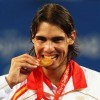By Randy Walker
Rafael Nadal announced Thursday that he was forced to pull out of the London Olympic Games due to what wire services are describing as “an undisclosed fitness problem.”
The 2008 gold medalist in singles – and the announced Opening Ceremony flag bearer for Spain – said in a statement that the decision was “one of the saddest days of my career.”
“I am not in condition to compete in the London Olympics and therefore will not travel as planned with the Spanish delegation to take part in the Games,“ Nadal said. “One of my biggest ambitions, that of being Spain’s flag bearer in the Opening Ceremony of the Games in London, cannot be. You can imagine how difficult it was to take this decision.”
Nadal, ranked No. 3, has not played since he was eliminated in the second round of Wimbledon in five-sets to then 100th-ranked Lukas Rosol. The Opening Ceremonies of the Games is eight days away and the tennis competition beginning on July 28. Nadal was seeking to become the first man to successfully defend a gold medal in Olympic tennis history. The grass courts at the All England Club, where the 2012 competition is being held, was the site of Nadal’s 2008 and 2010 Wimbledon singles titles.
“I have to think about my companions, I can’t be selfish and I have to think of what’s best for Spanish sport, especially tennis and Spanish players and give fellow sportsmen with better preparation the chance to compete,” he said. “I tried to hurry my preparations and training to the very last minute, but it was not to be.”
Nadal’s position on the team in singles will be awarded to Feliciano Lopez, according to the Spanish Tennis Federation. Nadal won the singles tournament at the 2008 Beijing Games, defeating Fernando Gonzalez of Chile in the final.

In the history of tennis in the Olympics, pull-outs has become almost as much of a tradition as the Olympics Games itself, as documented in the new KINDLE ebook “Olympic Tennis: An Historical Snapshot” ($2.99 available here: http://www.amazon.com/gp/product/B008EOXW40?ie=UTF8&camp=213733&creative=393177&creativeASIN=B008EOXW40&linkCode=shr&tag=newchapre-20&keywords=Olympic%20Tennis%20Randy%20Walker&qid=1342711393&ref_=sr_1_1&sr=8-1 via amazon.com)
Maria Sharapova was the most high-profile pull out from the Beijing Games as the reigning Australian Open champion that year could not compete due to a shoulder injury that would take plague her for the coming years. Other less celebrated pullouts from Beijing included Marcos Baghdatis and Jo-Wilfried Tsonga. Some other examples of high profile pullouts from past Games include Pete Sampras and Steffi Graf before the 1996 Games in Atlanta, (strained Achilles tendon and left knee injury, respectively) Andre Agassi before the 2000 Games in Sydney (cancer diagnosis to his mother and sister), Serena Williams and Jennifer Capriati before the Athens Games (left knee and hamstring, respectively).
Another great American tennis champion, Bill Tilden, took perhaps the same reasoning when skipping the Olympic tennis competition at the 1924 Games in Paris, although his public excuse for missing out on the Games was due to his journalistic contracts. On March 11, 1924 – as documented in the my book On This Day In Tennis History ( available here: http://www.amazon.com/gp/product/0942257421?ie=UTF8&camp=213733&creative=393185&creativeASIN=0942257421&linkCode=shr&tag=newchapre-20&keywords=On%20this%20day%20in%20tennis%20history&qid=1342711936&ref_=sr_1_cc_1&s=aps&sr=1-1-catcorr via amazon.com) Tilden announced that he will not represent the United States in the Paris Games. Tilden’s reasoning is that even if he wanted to play for the United States, the U.S. Olympic rule that forbids athletes from writing for newspapers prevents him from competing since he is contracted to write two articles per week for various outlets. Wrote the New York Times on the day “The tennis champion had never definitely announced that he would go abroad this year if picked for the Olympic team. Two months ago, Tilden said he did not think he would go because of the sharp competition expected in the national singles and in the Davis Cup matches. He said he regarded the Davis Cup competition more important than the Olympics and that he felt he could husband his strength for those matches in the event he is to be one of the contestants.” The USLTA also had enacted a similar rule for amateur tennis, but it is not scheduled to take effect until Jan. 1, 1925.
Also in 1924, French superstar Suzanne Lenglen withdrew from the competition in the capital city of her home country due to illness. She does, however, attend select sessions of the competition. Reported the Associated Press on the first day of the 1924 competition, “Suzanne Lenglen, the world’s champion, watched some of the matches until the sun became too uncomfortably warm for her. She looked thinner than usual. Mlle. Lenglen said she still felt ill and her appearance bore out her statement.”
The benefactors of Tilden and Lenglen’s withdrawals in 1924? Vincent Richards, Tilden’s Davis Cup teammate who won singles gold over France’s Henri Cochet, and Helen Wills, who won the singles competition over France’s Didi Vlasto.
